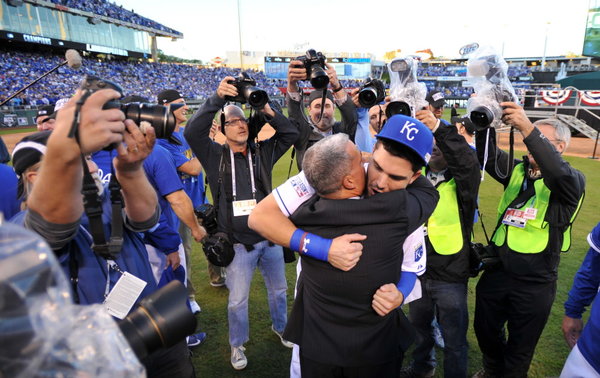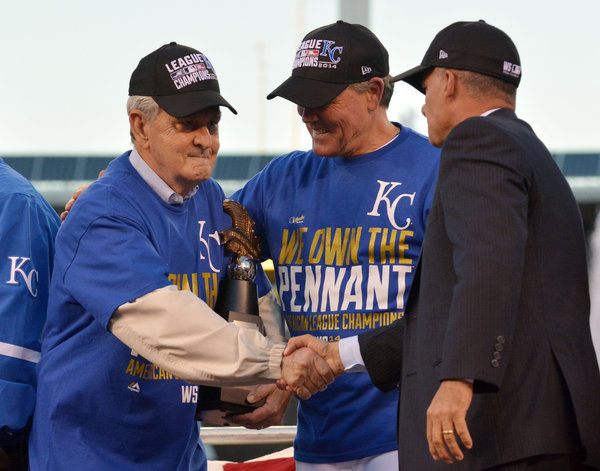
KANSAS CITY, Mo. — Dayton Moore sat in the home dugout at Kauffman Stadium early Wednesday afternoon, a few hours before his Kansas City Royals would burst from that same bench onto the field as champions of the American League. David Glass, the Royals’ owner, found Moore, the team’s general manager, and told him how much he had enjoyed the previous night’s 2-1 victory over the Baltimore Orioles. The game, Glass said, was baseball the way it was meant to be played.
Glass, 79, the former Walmart chief executive, asked Moore if he could do anything for him. Just cheer, Moore replied — because, really, Glass had already done plenty. He has never given Moore a very high payroll, but he has provided him with something even more precious: the time to implement a vision that has, at last, led the Royals to the World Series. They roll in with eight consecutive victories, a record to start a postseason.
“Dayton told the Glass family, ‘This is what we need,’ and they’ve supported him,” said Mike Sweeney, the former Royals first baseman and a baseball operations assistant. “His vision’s come to fruition, and it’s beautiful. Unwavering.”

Sweeney last played for the Royals in 2007, Moore’s first full year as general manager. That season Sweeney finished a contract worth $55 million, a figure the Royals still have not exceeded for any one player. There were no quick fixes for Moore and the Royals, no easy ways out of a postseason drought that stretched to 1985.
There was only a process.
“I know he took heat because, along the way, when we weren’t winning as much as fans thought we should, he used the word ‘process,’ and people made fun of that,” said Mike Arbuckle, a senior adviser to Moore. “But it was a process. He stuck to every part of the process to get us where we are, and his leadership has allowed us to do that.”
The blueprint was to nurture Alex Gordon and Billy Butler, then the Royals’ best young players, and sign them to long-term contracts; develop more top prospects — through the draft and internationally — and sign them, too; trade other prospects for outside help; and sign a few bargain free agents, if possible.
All of it has happened, and all with the underpinnings of an unrelenting philosophy. Moore believed the Royals could not rely on power hitters to be competitive. The ballpark was too big, and even if a young player did become a top slugger, he would price himself out of the Royals’ budget through salary arbitration.
It was cheaper to cultivate speed, which players could use not only on the bases but also in the field, thus aiding the pitchers.
“When we set out to put a team together, we knew we were going to have to do it with pitching and defense and speed,” Moore said. “We know we’re not going to have power, but hopefully our hitters can give us a professional at-bat and put the ball in play. We still struggle in a lot of areas; it’s not a push-button club.”

The Royals make contact better than any other team. Their hitters had the fewest walks — and by far the fewest strikeouts — in the majors this season. They also hit the fewest homers, but led in stolen bases. They averaged 4.02 runs per game, just below the major league average of 4.07.
So it was an ordinary offense, in terms of output, with an unusual character. Through that prism, it is easier to understand Manager Ned Yost’s stubborn fondness for so-called small ball. He has well-founded confidence that his hitters will put the ball in play, and that his base runners can cause havoc.
“I’m real comfortable in my own skin,” Yost said. “I don’t feel like I need vindication. I’m not looking for it; don’t care for it. None of this was ever about me.”
Moore has emphasized consistency of vision, from Glass on down. Every spring, Moore said, he has told the team that everyone’s success is tied together. He has been open with players about his strategy, and has felt a responsibility to them to augment the roster after a fourth consecutive season with at least 90 losses in 2012.
“Part of creating organizational harmony is articulating a plan and doing everything you can to execute it,” Moore said. “When we sign our players long-term, they all want to win. These guys are the most competitive people on the planet and they want to be a part of a winning team, a winning culture. So we made a commitment: We’ve got to give our absolute best as a leadership team, in baseball operations, to support their efforts.”
At the time, outfielder Wil Myers had never played — and, significantly, had never failed — in the major leagues. He was Baseball America’s minor league player of the year in 2012, and his value could not have been higher. Moore packaged Myers with three others to the Tampa Bay Rays for an ace, James Shields, and the top setup man Wade Davis.
The Royals won 86 games last season, narrowly missing the playoffs, then added starter Jason Vargas and second baseman Omar Infante, both with four-year contracts, through free agency. The players appreciated the show of confidence. And for Gordon, the team’s cornerstone, the bond with Moore runs deeper.

A former college infielder, Moore sold Gordon on a plan to move from third base to left field in 2010, citing examples of others, including Milwaukee’s Ryan Braun, who had made successful transitions. Gordon, drafted second over all in 2005, before Moore’s arrival, had seemed like a bust at the time. He became an All-Star and a Gold Glove winner.
“When I was struggling, he wanted to make sure I was O.K.,” Gordon said. “The first thing he said was, ‘I want to make sure you and your family are good.’ He really cares about you and he’s very supportive. I’ve only worked for one G.M., but I can’t imagine there’s a nicer or better person in this business, and I know the guys in here feel the same way.”
On the field after winning the pennant, Moore marveled at Gordon’s effort on a sprawling, tumbling catch at the wall in the fifth inning. It was only the latest sparkling defensive play of the Royals’ postseason, with others by Eric Hosmer, Mike Moustakas, Alcides Escobar, Lorenzo Cain and Nori Aoki.
“We understood from Day 1 the importance of having athletes who could run down the baseball here,” Moore said. “The reason we’re successful is our starting pitchers throw strikes and our bullpen matches up well late and the outfield catches everything in the air. That’s been the most consistent part of our team.”
No other outfield in the majors has as much square footage as Kauffman Stadium’s, and Moore acknowledged that he used to lobby Glass to move in the fences. Glass always resisted, insistent that doing so did not align with a plan based on pitching and defense.
The boss was right, and no team may be more suited to its ballpark than the Royals.
“It’s as dynamic a team as you’ll see,” said Raul Ibanez, the veteran outfielder, who also played for the Royals in the early 2000s. “You have to know your identity, and this team knows how to play its game.”
If the players did not understand who they were, they would not last here long. The Royals’ adherence to a rigid self-image, honed through years of patience, has given them another identity: American League champions.